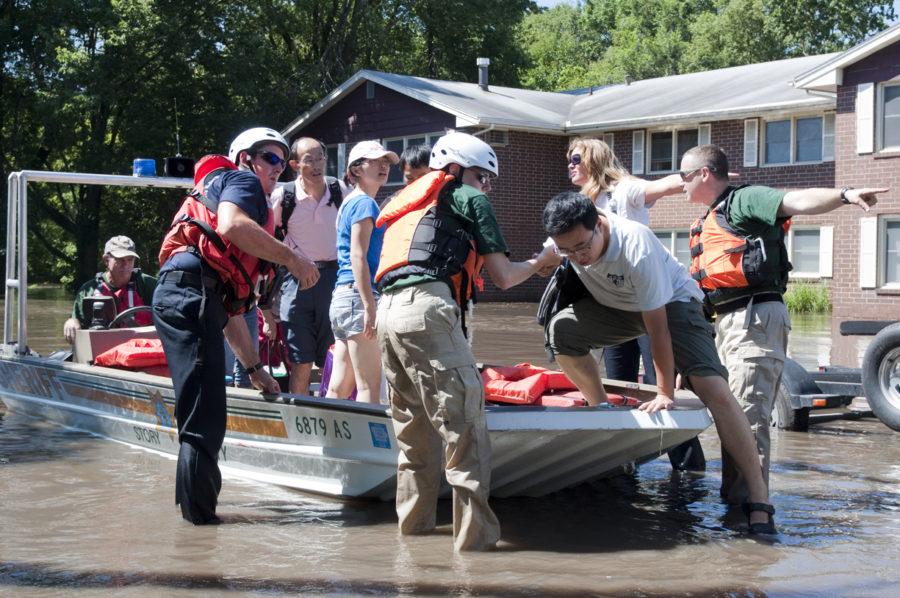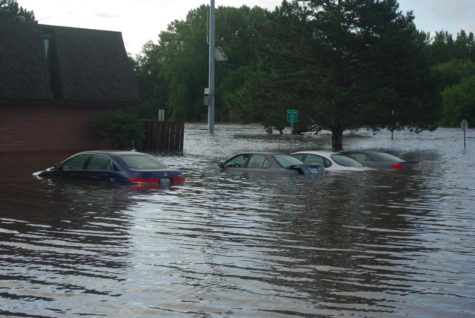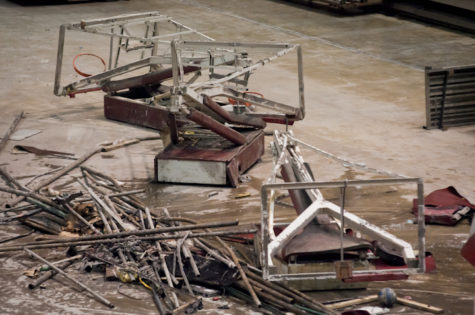The Flood of 2010
Photo: Logan Gaedke/Iowa State Daily
Ames residents are lifted to dry land after flooding on Wednesday, Aug. 11, 2010, near South Fourth Street. Ames Fire and Rescue worked with the Story County Sheriff’s Department to evacuate residents from flooded apartment complexes.
August 11, 2010
These floods have wreaked havoc on the Ames community: They have affected everything and everyone, with almost unfathomable damage to people’s property and lives.
Let me back up — today was my first day working at the Iowa State Daily. I was eager to get started and showed up about 20 minutes earlier than I needed to. I expected some sort of orientation, learning how to use the systems and meeting my co-workers. Instead, I was told to go find how the flood has affected people individually.
I leave the newsroom feeling overwhelmed — I have no idea what to do or where to start, so I call my friends, looking for people who had been inconvenienced by the weather. Then, by chance, I come across someone who knew the city of Ames electrical department supervisor.
This was exciting — my first day and what a way to start my first story — but the flooding has almost completely boxed certain areas in, so I end up meandering aimlessly around town trying to find a way to get to where I was going. My head raced with a million thoughts — what was I going to write? What questions should I ask? How do I do my job? As I passed various flooded areas I briefly consider the coincidence that the album cover for the CD in my car is a post-apocalyptic, flooded cityscape, and the song is called “Defend Atlantis”
Then I stop. Everything shuts down as I see a trailer park — but not just that. I see a family standing, staring with completely blank faces at their mobile home. It’s literally half submerged in water, and the roof of their Ford Taurus just barely is visible over the surface. The gravity of this scene hits me — this family’s home has been entirely destroyed, and all they can do is stare at it. I silently contemplate this for the rest of my drive.
I finally arrive at my destination. The man’s name is Donald Kom, and he has been nice enough to meet me at his house. As I step inside Kom, a middle-aged man in the Air Force reserves greets me. A single word describes how he looks — exhausted. He has dark circles under his eyes, is wearing business pants and a white T-shirt, and has a 5-o’clock-shadow that somehow doubles the aura. This is a man who has had no sleep — he probably has been up for more than 24 hours, and has been dealing with everything from damage to the electrical infrastructure to neighbors calling his personal phone to complain about power outages.
“If we didn’t have the flood today would have been a peak electricity day.” He describes to me how the flooding affects his department and how they have to shut off parts of the grid to avoid damage, but then he tells me about his friend Albert. Albert is a senior citizen who lives in a house in Ames. Albert’s keeps mementos from his long and memorable life in his basement, which had flooded. This man had lost almost everything there: photos, trinkets, all of the items he used to remember his life had been destroyed.
So now we are where we started. The flood has made life difficult for a lot of people: students who can’t get from place to place, elderly nursing home residents who barely can remember where they are being evacuated from their homes and people who have lost their homes completely.
It’s my first day on the opinion desk, so here’s my opinion: This flood sucks.












